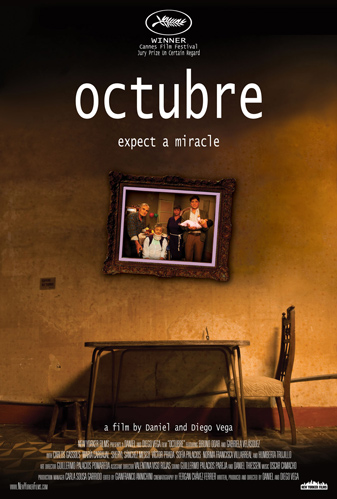Home Video Hovel- Octubre
I’m typically not one to say, “well, they really could have shaved a few minutes off of that,” because ultimately, who cares, but let’s get this out of the way right now – Octubre is a short film stretched to feature length. Its very thin premise begins when a baby is left at the home of a moneylender who, we can tell almost immediately, couldn’t know or care less about raising a child. His work keeps him busy and frequently out of the house, and when he’s not working, he spends a good deal of time with prostitutes. But after visiting social services and being advised that the best solution might just be to care for the infant himself, he decides to make do.
From there, Octubre (titled after the month in which the film takes place) pretty much follows the thematic trajectory one would expect from this outline, but does so in a sensitive, nuanced, caring manner that on the whole, I found very winning. As Clemente, Bruno Odar gives a very subtle, but communicative performance as a moneylender whose only thoughts in his adult life regarded making a living and getting off, and has made a nice little routine from that. The ways in which the baby upsets this routine are minor, and Odar lets us know that Clemente is just as upset by the intrusions as he is at the fact of them. Soon after taking the baby as his own, Clemente hires a housekeeper, Sofia (Gabriela Velásquez), and their relationship – or lack thereof – begins to dominate the film in interesting ways, as she becomes yet another person for whom Clemente has to care.
Brothers Daniel and Diego Vega direct the film in a manner not unfamiliar to those who’ve seen even some Aki Kaurismäki (I’ve only seen Le Havre, but his influence was extremely apparent), both in the way they find humanity in subtle behaviors, but also the way in which they engage humor. Octubre is not what I’d call a “funny” film, but it’s a pleasant affair buoyed by its humorous touches.
New Yorker Films, a paragon of theatrical distribution but whose home video quality was frequently uneven, comes roaring back to life with a magnificent DVD release that I’d enthusiastically recommend ahead of many studio Blu-ray releases in sheer quality of presentation. The visual style of the film is defined by heavy browns, and New Yorker has done a great job of keeping them rich and distinguished, never muddy. The image is crisp and clear, shows a surprising amount of depth for a DVD transfer, and really does the film’s assured visual style justice. The film is presented in anamorphic widescreen with a 2.35:1 aspect ratio.
There’s less for them to do on the audio end of things, as this isn’t exactly a sonically dynamic experience, but the dialogue is clear and robust, and the ever-present diegetic soundtrack really comes alive.
Moving onto the special features, the main show is theoretically a twenty-minute interview with co-director Daniel Vega, and while he offers some sturdy insight into the cultural undercurrents of the film, I can’t say it’s worth putting up with New Yorker’s presentation of it to get to them. Looking and sounding like it was shot on a cheap camcorder, it’s not always easy to for Vega to actually be heard, and it is far from a pleasing experience when he can. Things like a proper microphone might seem like minor issues, but as anyone who listens to enough podcasts can tell you, presentation really is half the battle.
Better is a 10-minute short film by the Vega brothers titled Inside Down Basement, a pitch-black comedy about an elderly couple attempting to commit suicide. It’s presented in non-anamorphic widescreen, but is still pretty decent quality all things considered, and displays many of the stylistic habits that define Octubre.
It all comes wrapped in a very handsome cardboard sleeve akin to Oscilloscope’s releases, or Sony’s The Social Network Blu-ray for my fellow home video geeks out there.
Octubre may be a minor film, but it does signal the arrival of a filmmaking team worth keeping your eye on. This is only their first feature, and if its only misstep is a relative conservatism of scale, that’s pretty damn great.





























